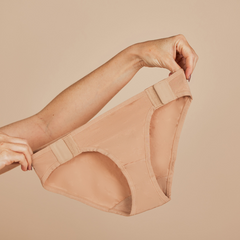
Tips for rotator surgery don’t just apply to your recovery. There are a number of things you can do before your operation to make life afterwards easier and better protect your rotator cuff from post-surgery strain.
Shoulder surgery can be very limiting. For a few weeks, you will likely have to wear a sling which can complicate things like cooking, dressing and even putting on a bra. Luckily there are ways that you can prepare to tackle these tasks one-handed.
Read: How to get dressed after rotator cuff surgery.
Tips For Before Rotator Cuff Surgery
Facing rotator cuff surgery can be both daunting and somewhat of a relief.
For those living with pain and limited mobility, rotator cuff surgery can help to move forward and regain some shoulder movement. Preparation for both before and after the procedure plays a vital role in ensuring a smooth recovery.
Ask Questions
Before surgery, be sure you ask your doctor or surgeon about what to expect. Potential complications, expected outcomes and recovery expectations are really important for alleviating anxiety and preparing you mentally for surgery.
Pre-Plan Suitable Clothing
Consider what you'll wear when you leave the hospital and during the recovery period. Opt for loose-fitting, front-fastening clothing that minimizes the need for overhead movement. This is particularly important as you won't be able to raise your arm comfortably for a couple of weeks post-surgery.
It may be wise to invest in a comfortable, front closing bra or some slip-on shoes for the few weeks when you might be wearing a sling and have restricted mobility.
Make Your Home Accessible
Arrange your living space to accommodate your restricted movement. Place commonly used items at reachable heights to avoid unnecessary stretching or reaching. Consider investing in adaptive tools that can make daily tasks more manageable.
Arranging things to be close before surgery will often help to avoid reliance on others and mean you don’t need to purchase tools like grabbers.
Prepare To Need Help
Accept that you will sometimes need assistance, especially in the initial days following surgery. Inform friends or family about your upcoming procedure and discuss a plan for someone to be available for support when you need it.
If a loved one has undergone rotator cuff surgery, you may be able to help by preparing meals, helping with dressing or even just being there to keep them company as they rest.
Post-Operative Tips For Rotator Cuff Surgery
Following your operation, there are some tips for rotator cuff surgery that can aid a smooth and effective recovery.

Get Plenty Of Rest
One of our top tips for rotator cuff recovery is to get plenty of rest. Rest is crucial for the healing process. Prioritize sleep and ensure you are getting adequate rest. Modify your sleeping arrangements to minimize pressure on the operated shoulder.
Physical Therapy
Physical therapy is really important for recovery. Shoulder injuries especially rely on focused movement for a full recovery. Not properly engaging with exercises given by your medical team can lead to limited shoulder mobility long-term.
Be Open About Any Concerns
Communication with your healthcare team is key. If you experience unexpected pain, swelling, or have concerns about your recovery, share them openly with your surgeon and physical therapist.
Similarly, discuss any concerns with loved ones. They may be able to help you with dressing or adapting things in your home so that you can be more comfortable or better access things you need.




